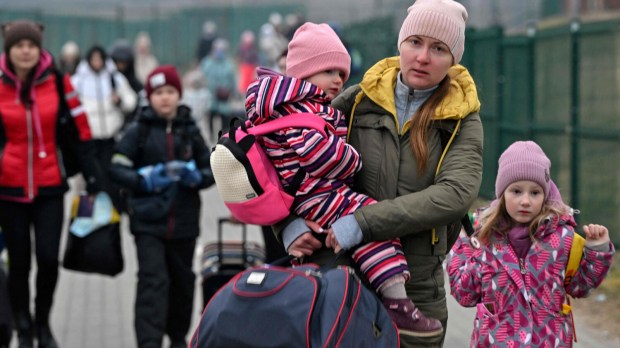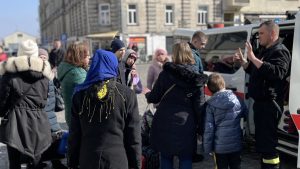“I can’t think of any other country that has received more than a million refugees in 12 days,” says Jesuit Fr. Vitaliy Osmolovskyy, coordinator of the Jesuit Refugee Service (JRS) of the two Polish provinces of the Society of Jesus.
He tells I.Media how the Polish people are facing the influx of refugees, stressing the need to act now for reconciliation between Ukrainians and Russians.
Originally from Ukraine, Fr. Osmolovskyy was working on a thesis at the University of California, Santa Cruz. However, when the conflict broke out, his superiors called him back to Poland because of his language skills—he speaks Russian, Ukrainian, Polish, Italian and English—and his experience in humanitarian aid.
Since the Russian invasion, he has been navigating between Krakow, Warsaw, Danzig, and the border towns coordinating emergency relief, but also planning longer-term assistance. His parents chose to stay in Ukraine, in a military town near Kiev.
How are the Polish people reacting to the influx of Ukrainian families?
Father Osmolovskyy: There is great generosity on the Polish side. This is a really big phenomenon; I can’t think of any other country that has received more than a million refugees in 12 days. The Polish people are incredible. The people are taking in all these people and trying to provide them with a roof, food. Many Poles who own apartments that they used to rent have decided to make them available to the refugees for free.
But we also see that the situation is getting worse. The number of new arrivals is increasing in some cities. If this continues, in one or two weeks it will be too much… This is why we try to redirect people to other countries, like Germany, Italy, Spain, France, or Croatia.
What is the Jesuit Refugee Service doing in this context?
Father Osmolovskyy: Since the first day of the war, our parishes have been receiving people all day long, and orienting them. All our communities in Poland are involved. Our priority is to help the Ukrainian communities through JRS in Lviv. Here in Poland, we have a five-person organizing team, supported by many volunteers and Jesuit networks around the world. We also have a bus that brings supplies to Ukraine once or twice a week, and brings refugees back to Poland. We gather funds with NGOs for food and hygiene products, medical assistance, and psychological support.
One of the most difficult moments of our work is to see the men who take their families to the border and leave them there.
How are Ukrainian families living this drama?
Father Osmolovskyy: One of the most difficult moments of our work is to see the men who take their families to the border and leave them there. They say what may be their last goodbye. Then the men go back to the front lines in Ukraine, to fight, to protect their homes. Many people are burdened with tragedies, especially those from the eastern part of Ukraine, where the most violent conflicts are taking place. They had to leave their homes in the winter—it is very cold here—and they left with only what they could carry.
Many people of the World War II generation, like my grandparents who experienced the concentration camps in Germany, have passed on something of their trauma. And the younger generation will experience post-traumatic stress again. They are already psychologically marked by this war.
How do you intend to deploy your action in the medium term?
Father Osmolovskyy: First of all, there’s the humanitarian part. For example, it involves ensuring the health of the most vulnerable. We recently received a group of mothers whose children have cancer. We’re trying to find them a place to live and to provide them with support. We have plans for scholarships for the children of families who decide to stay here.
But we also have to deal with reconciliation. I’m thinking of the wave of refugees who are leaving Russia for Armenia, Azerbaijan, Georgia, and Turkey. What will happen when Ukrainian refugees meet Russian refugees on neutral territory? As Jesuits, we must already prepare for this, and think about creating a safe space where people can talk, share, and participate in reconciliation. Between Ukraine and Russia there are a lot of mixed marriages, and I already know that some couples have separated because of these events. This is a big problem.
What is your approach to reconciliation?
Father Osmolovskyy: In welcoming Ukrainians, we collaborate with the government, with NGOs, with religious organizations of various affiliations, and even with Mormons. This shows that humanity, human values, unite us. And I think we need to focus on what unites us rather than what divides us. Regardless of political preferences or religion, let’s focus on our humanity and helping those in need.
Pope Francis sent two cardinals—Konrad Krajewsky and Michael Czerny—to support the Ukrainian people in the region.
Father Osmolovskyy: Cardinal Czerny, who is a Jesuit, knows what a Soviet invasion means. He lived through one in his home country, Czechoslovakia. He knows what it means to suffer, to lose all your possessions in one minute. He’s a true witness of human suffering in the world.
On the side of the Society of Jesus, the Assistant of Father General for Central and Eastern Europe, Fr. Tomasz Kot, will come to Poland in the next few days, to support us and to share information.


